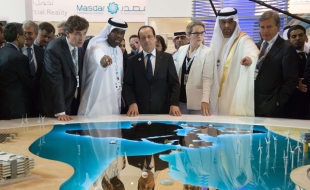More than 3,000 people from 150 countries, including world leaders and government ministers gathered in the UAE capital Tuesday for the sixth World Future Energy Summit (WFES).
The summit will discuss, debate and display the latest ideas in renewable and clean energy by business executives, academics, scientists, engineers, developers, global companies and entrepreneurs.
In a keynote speech, French president Francois Hollande told the official inauguration of Abu Dhabi Sustainability Week that the world needs to spend more on renewable energy.
“If we don’t spend … we will have a catastrophe,” Hollande said, adding that failure to spend on renewable energy could raise demand for fossil energy and “make its prices unaffordable,” according to a report by Al Arabiya TV.
Organizers of the three-day summit, which is held simultaneously with the first International Water Summit, say that around $257 billion were spent on renewable energy projects around the world in 2011.
Hollande said it is estimated that $300 billion of investments in sustainable renewable energy are needed this year but the requirement comes during the times of economic crises.
He called for all countries to contribute and proposed establishing joint funds between oil producing and consuming countries for the purpose.
“France wants to make the transition in energy resources a national, European and global cause,” Hollande said.
Global investments in renewable energy in 2004 totaled $54 billion and accelerated in 2011 to reach its zenith at $280 billion.
But according to Al Arabiya correspondent, a new study shows that investments in renewable energy dropped for the first time by 10 percent in 2012, signaling the biggest decline since 10 years.
The decline, however, doesn’t represent the waning of the renewable energy trend, but the decline represents decrease in renewable energy costs.
Prices of solar modules have fallen by 75 percent in the last four years while wind turbines fell by 25 percent in the last three years.
Meanwhile, Argentine President Cristina Kirchner stressed that the main contributions must come from developed nations whose energy consumption, and consequently emissions, are much higher than poor nations.
“Responsibility lies on all, but not in equal shares … developed nations’ contributions must be much higher,” she said, adding that Latin America and the Caribbeans are responsible for only five percent of harmful emissions.
Opening the summit, crown prince of Abu Dhabi, Sheikh Mohammed bin Zayed al-Nahayan, said Abu Dhabi is providing the platform to overcome the challenges facing the spread of renewable energy.
Queen Rania of Jordan called for finding “sustainable solutions” to energy needs. Without this “progress will be slow and uneven. Not just in this region, but everywhere.”
“Today 1.4 billion people, one in five in the world, still cannot access grid electricity. For a billion more, access is unreliable,” she said.
The Abu Dhabi-based International Renewable Energy Agency (IRENA) on Monday launched a new global roadmap to consolidate efforts to double clean energy by 2030 but warned the process must be accelerated substantially to achieve the target.
“International efforts to double the share of renewable energy by 2030 are attainable but need to accelerate substantially if they are to be successful,” IRENA said.
The target aims to raise the share of clean renewable energy sources such as solar, wind and biomass to around 30 percent of global energy mix from around 16 percent currently.
“Based on estimates, by 2030, the renewable energy share will rise to just 21 percent, thus we will have a nine-percent gap,” IRENA Director General Adnan Amin told the closing session of the meeting.






